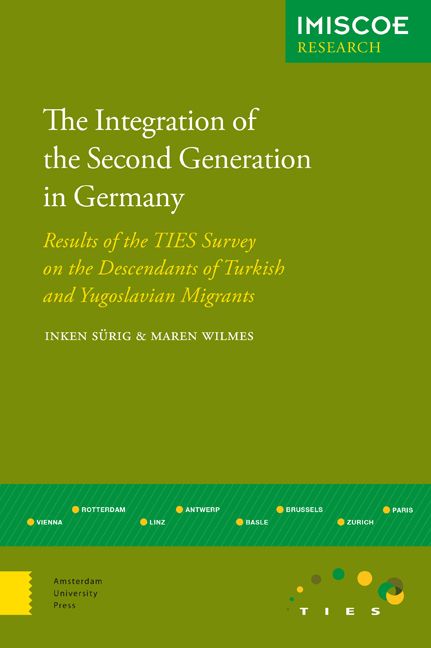 The Integration of the Second Generation in Germany
The Integration of the Second Generation in Germany Book contents
- Frontmatter
- Contents
- Preface: The International Research Project TIES
- 1 Introduction
- 2 Migration History and Basic Demographic Characteristics of the First Generation
- 3 Educational Careers and Educational Outcomes
- 4 Labour Market Positions
- 5 Segregation and Housing
- 6 Ethnic and Cultural Orientations
- 7 Social Relations
- 8 Family Formation and Partner Relationships
- 9 Conclusions and International Comparisons
- References
- Other IMISCOE Research Titles
Preface: The International Research Project TIES
Published online by Cambridge University Press: 11 December 2020
- Frontmatter
- Contents
- Preface: The International Research Project TIES
- 1 Introduction
- 2 Migration History and Basic Demographic Characteristics of the First Generation
- 3 Educational Careers and Educational Outcomes
- 4 Labour Market Positions
- 5 Segregation and Housing
- 6 Ethnic and Cultural Orientations
- 7 Social Relations
- 8 Family Formation and Partner Relationships
- 9 Conclusions and International Comparisons
- References
- Other IMISCOE Research Titles
Summary
TIES (The Integration of the European Second Generation), http://www.tiesproject.eu/, was started in 2005 as a research project on the second generation in eight EU member states. It was coordinated by the Institute for Migration and Ethnic Studies (IMES) at the University of Amsterdam and the Netherlands Interdisciplinary Demographic Institute (NIDI).
The TIES survey was aimed at the descendants of immigrants from Turkey, the successor states of Yugoslavia (SSYU), and Morocco. The ‘second generation’ was defined as those children of immigrants who were born and lived in their parents’ country of immigration. At the time of the survey, these individuals were between 18 and 35 years old. Besides the secondgeneration groups, a non-migrant control group was also surveyed. This consisted of persons whose parents were both born in the country where the survey was carried out.
Identifying migration as a primarily urban phenomenon, the research was conducted in fifteen cities in eight countries: Paris and Strasbourg in France, Berlin and Frankfurt in Germany, Madrid and Barcelona in Spain, Vienna and Linz in Austria, Amsterdam and Rotterdam in the Netherlands, Brussels and Antwerp in Belgium, Zurich and Basle in Switzerland, and Stockholm in Sweden. In almost all the cities, three different groups were interviewed: two second-generation groups and one control group. The two second-generation groups were of Turkish and Moroccan origin in the Netherlands and Belgium, and of Turkish and Yugoslavian descent in Germany, Austria and Switzerland. In France and Sweden, the funding allowed research on only one second-generation group (the descendants of Turks) and the control group. Due to the later influx of labour migrants, the Spanish project only addressed second-generation Moroccans and the control group.
As a first step, a preliminary TIES study in 2003 was funded by the Swiss Stiftung für Bevölkerung, Migration und Umwelt (BMU). The TIES study group formed in the course of this process comprised nine national partners and the international coordination unit. It convened in four international workshops to discuss the creation of a common research design. The second step was to secure funding, with the German VolkswagenStiftung being the first aboard to finance a core investigation, i.e. a survey among second-generation Turks in five countries.
- Type
- Chapter
- Information
- The Integration of the Second Generation in GermanyResults of the TIES Survey on the Descendants of Turkish and Yugoslavian Migrants, pp. 7 - 8Publisher: Amsterdam University PressPrint publication year: 2015


